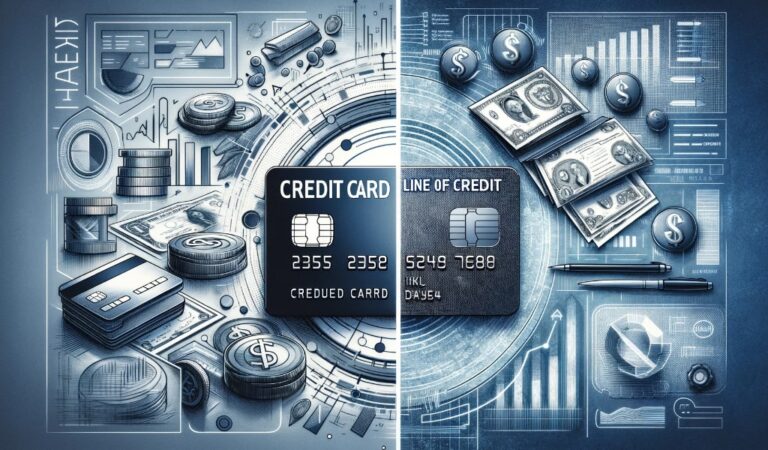Navigating the world of finance can be a maze, especially when it comes to choosing the right credit options. Two common but often misunderstood options are credit cards and lines of credit. Let’s break down the Credit Card vs Line of Credit puzzle in a way that’s not only easy to understand but also practical in your financial decision-making.
However, they are not the same. Below is a brief overview of their differences.
| Key Difference | Credit Card | Line of Credit |
|---|---|---|
| Access and Usage | Ideal for daily expenses, online shopping, smaller purchases. Instant access with card. | Suited for larger, ongoing expenses or projects. Access via bank transfers or special checks. |
| Interest Rates | Generally higher, especially if balances are carried over. | Typically lower, more cost-effective for larger borrowed sums. |
| Credit Limits | Lower limits, aligned with everyday spending. | Higher limits, suitable for significant expenses or emergencies. |
| Repayment Terms | Monthly payments required, full or minimum with interest. | Flexible repayment, often with initial interest-only payments. |
| Rewards and Benefits | Offers rewards like cashback, travel points. | No rewards, but benefits from flexibility and lower interest rates on borrowed funds. |
Detailed key differences between credit cards and Line of credit
1. Usage and Accessibility
Credit Card: Designed for daily expenses and convenient for both online and in-store purchases. The physical card allows for immediate transactions.
Line of Credit: More suited for significant, ongoing expenses like home renovations or funding education. Access to funds often requires bank transfers or special checks, making it less immediate than a credit card.
2. Interest Rates and Costs
Credit Card: Tend to have higher interest rates, particularly if you carry a balance month to month. Additionally, there may be fees for late payments, cash advances, and foreign transactions.
Line of Credit: Generally offers lower interest rates, making it more cost-effective for borrowing larger amounts over time. However, some lines of credit may come with annual fees or charges for unused credit.
3. Credit Limits and Loan Amounts
Credit Card: Generally, credit cards have lower credit limits, reflecting their intended use for everyday expenses and smaller purchases.
Line of Credit: Offers higher borrowing limits, which can be essential for significant expenses or as a financial backup for unforeseen costs.
4. Repayment Structure / Terms
Credit Card: Requires at least minimum monthly payments, with the option to pay more or pay in full. Interest compounds on any unpaid balance. There’s also a clear billing cycle with a due date each month.
Line of Credit: Offers more flexible repayment options. You might only need to pay the interest each month initially, with the principal amount repayable over a longer period. This can be beneficial for budgeting and managing cash flow.
5. Rewards and Incentives
Credit Card: Many credit cards offer rewards programs, such as cashback, travel points, and other bonuses, which can be a significant incentive for regular use.
Related Article: Read more about the advantages you could get with credit cards.
Line of Credit: Typically lacks the reward structures found in credit cards. The primary benefit is the ability to borrow larger amounts at lower interest rates.
Choosing the Right Option for You
When weighing the Credit Card vs Line of Credit decision, consider not just your immediate financial needs but also your long-term financial health. Credit cards are ideal for regular, smaller purchases and can offer rewards, but they come with higher interest rates.
Lines of credit, on the other hand, are more suitable for larger, planned expenses or as a safety net, offering lower interest rates but without the perks of rewards.
Bottom-Line
Both credit cards and lines of credit are valuable financial tools, but they serve different purposes. By understanding their key differences in terms of interest rates, repayment, usage, and credit impact, you can choose the one that aligns best with your financial situation and goals.


